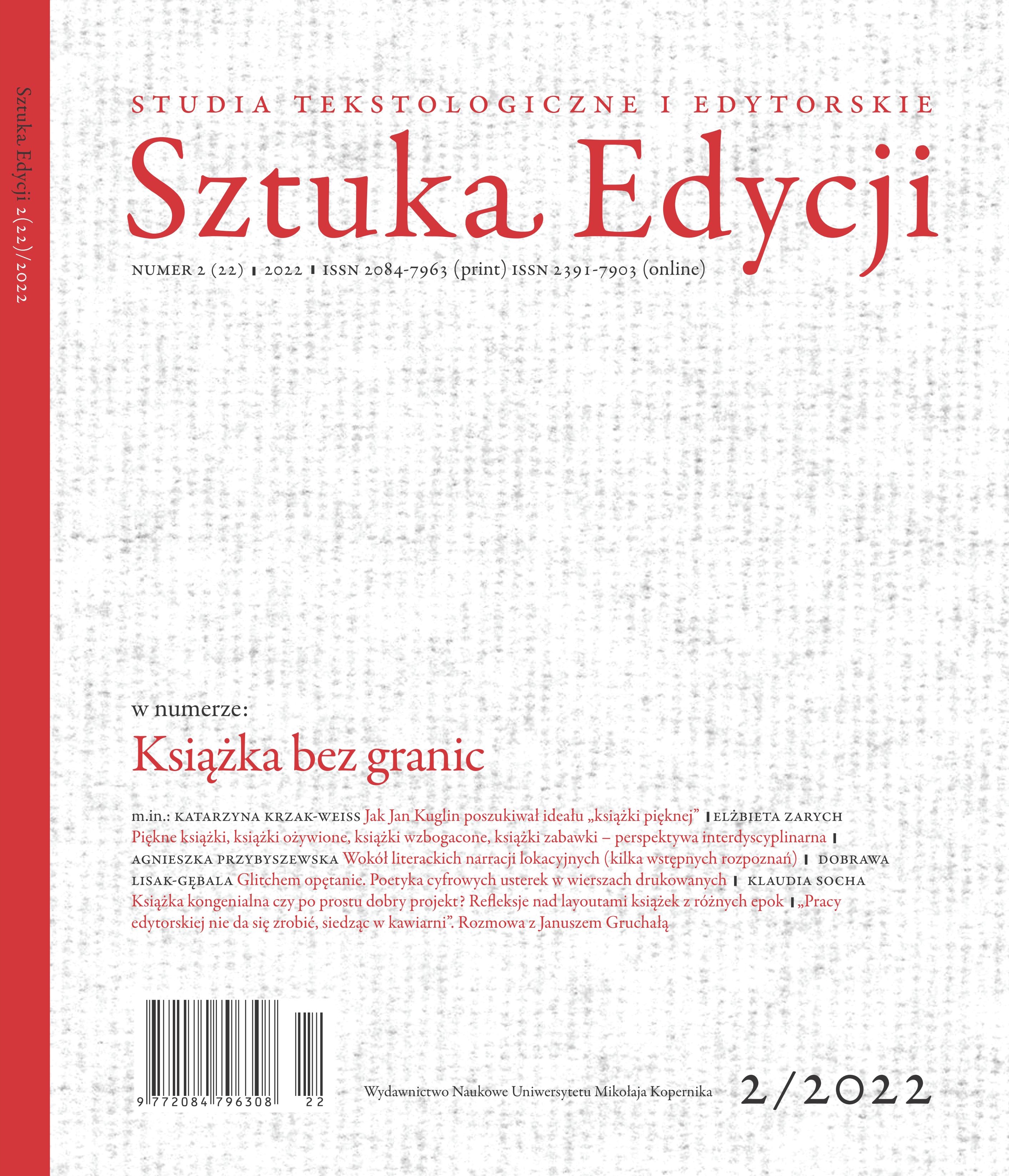Słowacki in manuscripts (the case of “Samuel Zborowski”)
DOI:
https://doi.org/10.12775/SE.2022.00022Keywords
Samuel Zborowski, Juliusz Słowacki, critical edition of a diary, topographic transliterationAbstract
The article is a presentation of the editorial fate of Samuel Zborowski, a mystical drama by Juliusz Słowacki, written in 1845 and left in manuscript. The difficult history of the text was influenced by the decision of the first editor of Słowacki’s works, Antoni Małecki, who did not include the unfinished drama to Pisma pośmiertne in 1866, viewing it as merely “disorder and confusion”. Successive editors – Artur Górski, Henryk Biegeleisen, Wiktor Hahn, Stanisław Cywiński, Juliusz Kleiner – faced with an extremely difficult autograph (devoid of a beginning and the final ending, full of deletions, containing several variants of the same passages), decided that first of all the author’s chaos should be sorted out and a final work should be created on the basis of the brief notes. During the elaboration of the text, they made arbitrary decisions – often freely and unjustifiably rejecting individual variants of passages – and thus became co-creators of the work. As a result, subsequent editions of the mystical drama turned out to be editorial creations, far from the author’s manuscript.
An expression of a completely different editorial attitude – based on respect for the autograph, aimed at preserving the work's original character – is the 2017 edition by Marek Troszyński. The editor’s main goal is to make available to the reader the manuscript chaos that is the essence of Słowacki’s mystical drama. To achieve this goal, the editor decided to include in the edition a likeness of the autograph, topographical transliteration and diachronic transcription. The diachronic transcription proposed by the editor organizes the text, but to a small, minimalist extent, in accordance with the accepted assumption of the necessity of preserving the brulion character of the work (the editor does not interfere with the author's work, does not separate the final text and variants, does not introduce conjunctions and emendations, does not mark speaking characters in the drama, and keeps spelling and punctuation modernization to a minimum).
References
Brzozowski J., Przychodniak Z., 2005, Od wydawców, w: J. Słowacki, Wiersze, oprac. J. Brzozowski i Z. Przychodniak, Poznań.
Małecki A., 1901, Juliusz Słowacki, Lwów.
Troszyński M., 2017, Alchemia rękopisu, w: J. Słowacki, Alchemia rękopisu. „Samuel Zborowski” Juliusza Słowackiego, Warszawa.
Słowacki J., 1954, [Szkic przedmowy z r. 1845], w: idem, Dzieła wszystkie, t. 14, pod red. J. Kleinera, oprac. W. Florian i J. Kleiner, Wrocław.
Bizior-Dombrowska M., 2008, Problemy tekstologiczne edycji „Samuela Zborowskiego” Juliusza Słowackiego, w: Z warsztatu edytora dzieł romantyków, pod red. M. Bizior-Dombrowskiej i M. Lutomierskiego, Toruń.
Rychter J. H., 1884, Z nieznanych poezyj Juliusza Słowackiego, „Kłosy”, t. 38, nr 972.
Górski A., 1909, Przedmowa, w: idem, Pisma Juliusza Słowackiego, t. 1, Warszawa.
Górski K., 1976, O krytycznym wydaniu „Dzieł wszystkich” Juliusza Słowackiego, „Pamiętnik Literacki”, z. 1.
Kleiner J., 1924, Słowo wstępne. O metodach wydania „Dzieł wszystkich” Słowackiego, w: J. Słowacki, Dzieła wszystkie, pod red. J. Kleinera, t. 1, Lwów.
Rymkiewicz J. M., 1982, Juliusz Słowacki pyta o godzinę, Warszawa.
Nawrocka E., 1992, Dramaty mistyczne Juliusza Słowackiego, w: Dramat i teatr romantyczny, t. 1, pod red. D. Ratajczak, Wrocław.
Raptularz wschodni Juliusza Słowackiego, 2019, t. 1–3, pod red. M. Kalinowskiej, U. Makowskiej, Z. Przychodniaka, M. Troszyńskiego i D. Kai, Warszawa.
Downloads
Published
How to Cite
Issue
Section
License
Copyright (c) 2022 Magdalena Bizior-Dombrowska

This work is licensed under a Creative Commons Attribution-NoDerivatives 4.0 International License.
Stats
Number of views and downloads: 577
Number of citations: 0



